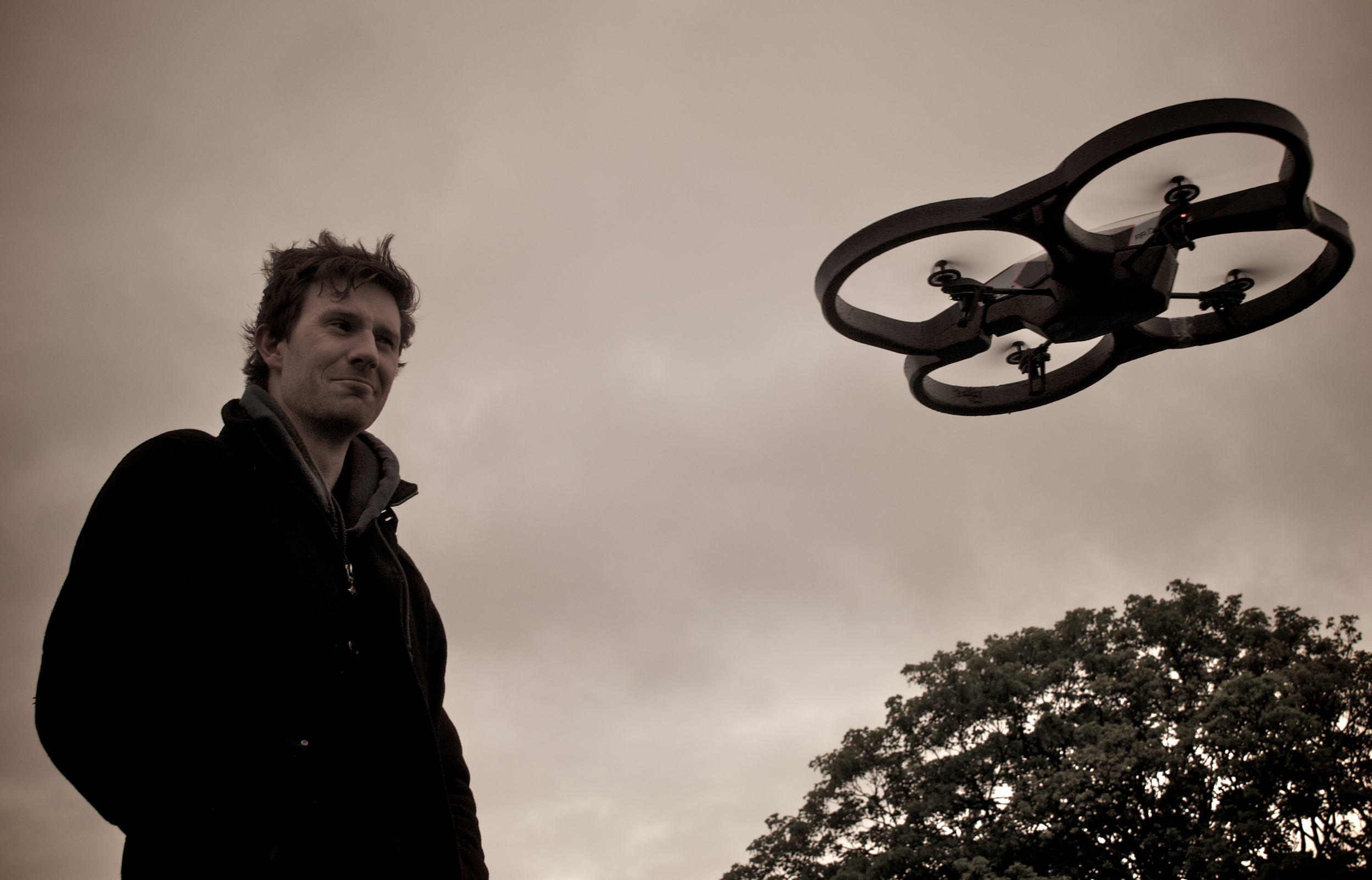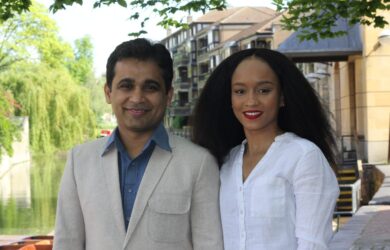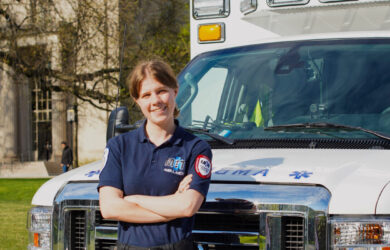
Alex Davies talks about his time as a Gates Cambridge Scholar and how it has influenced the work he is doing now at DeepMind.
Gates Cambridge is quite unique in how much everyone cares about the world and about doing work that has a positive impact on people. It has influenced how I think about work and what work I think is worth doing.
Alex Davies
Alex Davies has spent much of his academic career at the cutting edge of Computer Science and machine learning, unafraid to experiment across disciplines and push the boundaries.
Early in his PhD he created a Twitter map of happiness based on emoticons, which drew a lot of media interest. Shortly after finishing, he collaborated on a machine learning musical. Now at DeepMind after a stint at Google, he is working on some of the big challenges in natural science and says his Cambridge experience – including his time as a Gates Cambridge Scholar – has been a big influence.
Yet when he applied for his PhD he was unaware of the value of the Gates Cambridge community. All that soon changed when he started, though. Indeed Alex became President of the Gates Cambridge Scholars Council. He says: “Pretty early on I discovered that Gates Cambridge was a quite unique and well run community full of lots of very interesting people. I wanted to get more involved.”
He began as social coordinator on the Council and then became President in his second year and is really proud of what the Council achieved in that time. That included reviving the Global Scholars Symposium, set up to link international scholarship programmes in the UK, and bringing it to Cambridge with a keynote from the Dalai Lama.
He says: “Gates Cambridge has been really important to me and I am still in touch with people through the Alumni Association, especially during Covid. It has very much influenced me as a person. Gates Cambridge is quite unique in how much everyone cares about the world and about doing work that has a positive impact on people. It has influenced how I think about work and what work I think is worth doing.”
He adds: “The exposure to great and fundamentally intelligent people at Cambridge gave me an appreciation of the value of intellectual humility and of keeping an open and inquiring mind. Only good things can come from that.”
Early years
Alex [2010] was born and grew up in Brisbane, Australia. He attended a private secondary school for boys and describes himself as an all-rounder. He played a lot of sport, particularly water polo [he played on the Queensland team], took part in drama and was in both a band and the choir.
When it came to the end of his school career he was undecided about whether to study Computer Science or Medicine. Both his parents are in dentistry and he wanted to help people, but he had always really enjoyed computer programming. He took part in competitions with a friend from an early age and was on the Australian Informatics Olympiads team at secondary school. He was drawn to the freedom and creativity of programming and the logic which meant you could figure it out for yourself. This was encouraged at his school. His teacher let him and his friend spend a lot of extra time in the computer lab setting each other challenges and making games.
When he got to the Australian National University, Alex did not opt to do a straightforward Computer Science degree. Instead he did a PHB degree [Bachelor of Philosophy] which is viewed as a preparation for a PhD, given its focus on research projects. That gave him greater flexibility over his course, for instance, he was able to focus on machine learning.
Alex became very involved in college life during his undergraduate years in Canberra. He conducted the choir and played on various sports teams. He also took up internships with Google during his course. When it ended he had to choose between becoming a software engineer at Google and doing a PhD in machine learning. “I was so interested in machine learning that I felt the only way to understand it better was to do a PhD,” he says.
Cambridge
He applied to several universities, but chose Cambridge because Professor Zoubin Ghahramani’s laboratory was doing research with a very broad applicability which appealed to him. Alex got involved in a range of different machine learning projects at Cambridge. One involved creating a Twitter happiness map based on the words associated with a range of Twitter emoticons. He says it was the beginning of researchers taking advantage of the information social media could provide in bulk. “It was very motivating to make something like that that had not been made before,” he says. The last two years of his PhD were devoted to more theoretical work, however, as Alex looked to deepen his understanding of the techniques and statistics used in Professor Ghahramani’s laboratory.
After finishing his PhD Alex was planning to have a break and become a surfing instructor back in Australia. However, his thesis, “Effective Implementation of Gaussian Process Regression for Machine Learning”, which proposed a new framework for the implementation of Gaussian Processes used in some trading systems, was awarded a £10,000 prize by research and technology firm G-Research.
Alex decided to stay in Cambridge and got involved with a group who wanted to use machine learning to create a musical. Alex and one of his laboratory colleagues, James Lloyd, acted as consultants on the project. Initially the idea was to use machine learning to generate musical lyrics based on a database of existing lyrics. Some of the lyrics generated were good, but most were fairly poor so instead the project became based on a collaboration between machine learning and humans. “It was very interesting work and a little bit on the cutting edge – it hadn’t been done before,” says Alex. A documentary film was made about the project. “It turned out to be an entertaining musical and shows that machine learning could work with people in a creative way,” says Alex, adding that it was a good antidote to the theoretical nature of his PhD.
Google and DeepMind
Alex then took up a job at Google and moved to Silicon Valley. At the time Google was transitioning to becoming an “AI-first” company. Alex’s job in the central applied machine learning team was to travel to Google’s many offices and help product engineers understand machine learning.
After three years, he moved to London to join DeepMind. He had worked with the company before in his role at Google and knew some people there from his time at Cambridge. “I was very impressed by the CEO and the company’s values and what they were trying to achieve,” he says.
He spent a year doing similar work to his role at Google. Following its acquisition by Google, DeepMind was integrating its machine learning expertise into Google products, such as Android phones. Alex worked on how to improve the battery life of phones.
He then moved to the newly formed Science team. “I was very happy with the Android work and wanted to move to something that was conceptually challenging and would have a more fundamental impact on humanity,” says Alex. His current work is on the nexus between maths and AI.
He states: “The mission of the sciences programme is to take and make significant progress in the natural sciences. There is something incredibly powerful about contributing to the knowledge of humanity.”












